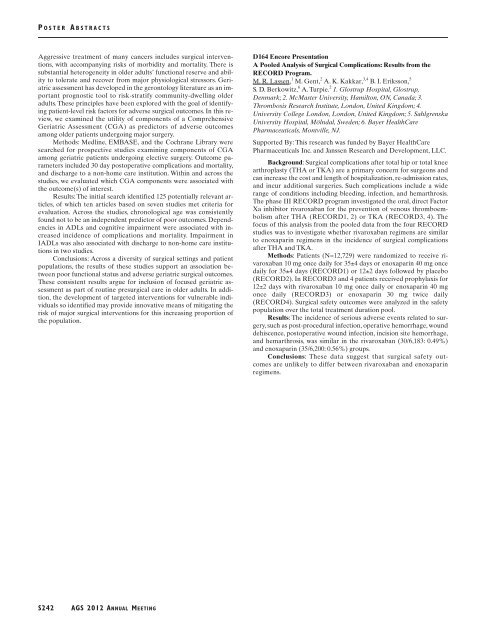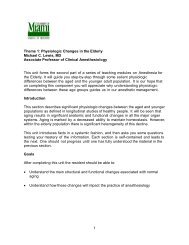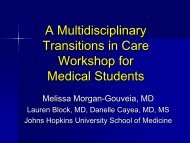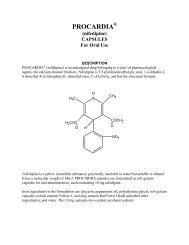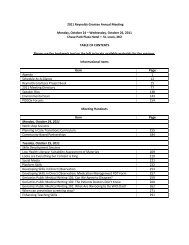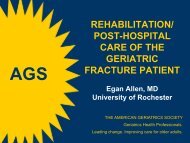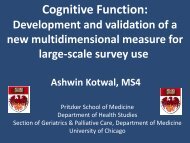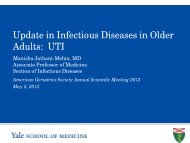Here - American Geriatrics Society
Here - American Geriatrics Society
Here - American Geriatrics Society
Create successful ePaper yourself
Turn your PDF publications into a flip-book with our unique Google optimized e-Paper software.
P OSTER<br />
A BSTRACTS<br />
Aggressive treatment of many cancers includes surgical interventions,<br />
with accompanying risks of morbidity and mortality. There is<br />
substantial heterogeneity in older adults’ functional reserve and ability<br />
to tolerate and recover from major physiological stressors. Geriatric<br />
assessment has developed in the gerontology literature as an important<br />
prognostic tool to risk-stratify community-dwelling older<br />
adults. These principles have been explored with the goal of identifying<br />
patient-level risk factors for adverse surgical outcomes. In this review,<br />
we examined the utility of components of a Comprehensive<br />
Geriatric Assessment (CGA) as predictors of adverse outcomes<br />
among older patients undergoing major surgery.<br />
Methods: Medline, EMBASE, and the Cochrane Library were<br />
searched for prospective studies examining components of CGA<br />
among geriatric patients undergoing elective surgery. Outcome parameters<br />
included 30 day postoperative complications and mortality,<br />
and discharge to a non-home care institution. Within and across the<br />
studies, we evaluated which CGA components were associated with<br />
the outcome(s) of interest.<br />
Results: The initial search identified 125 potentially relevant articles,<br />
of which ten articles based on seven studies met criteria for<br />
evaluation. Across the studies, chronological age was consistently<br />
found not to be an independent predictor of poor outcomes. Dependencies<br />
in ADLs and cognitive impairment were associated with increased<br />
incidence of complications and mortality. Impairment in<br />
IADLs was also associated with discharge to non-home care institutions<br />
in two studies.<br />
Conclusions: Across a diversity of surgical settings and patient<br />
populations, the results of these studies support an association between<br />
poor functional status and adverse geriatric surgical outcomes.<br />
These consistent results argue for inclusion of focused geriatric assessment<br />
as part of routine presurgical care in older adults. In addition,<br />
the development of targeted interventions for vulnerable individuals<br />
so identified may provide innovative means of mitigating the<br />
risk of major surgical interventions for this increasing proportion of<br />
the population.<br />
D164 Encore Presentation<br />
A Pooled Analysis of Surgical Complications: Results from the<br />
RECORD Program.<br />
M. R. Lassen, 1 M. Gent, 2 A. K. Kakkar, 3,4 B. I. Eriksson, 5<br />
S. D. Berkowitz, 6 A. Turpie. 2 1. Glostrup Hospital, Glostrup,<br />
Denmark; 2. McMaster University, Hamilton, ON, Canada; 3.<br />
Thrombosis Research Institute, London, United Kingdom; 4.<br />
University College London, London, United Kingdom; 5. Sahlgrenska<br />
University Hospital, Mölndal, Sweden; 6. Bayer HealthCare<br />
Pharmaceuticals, Montville, NJ.<br />
Supported By: This research was funded by Bayer HealthCare<br />
Pharmaceuticals Inc. and Janssen Research and Development, LLC.<br />
Background: Surgical complications after total hip or total knee<br />
arthroplasty (THA or TKA) are a primary concern for surgeons and<br />
can increase the cost and length of hospitalization, re-admission rates,<br />
and incur additional surgeries. Such complications include a wide<br />
range of conditions including bleeding, infection, and hemarthrosis.<br />
The phase III RECORD program investigated the oral, direct Factor<br />
Xa inhibitor rivaroxaban for the prevention of venous thromboembolism<br />
after THA (RECORD1, 2) or TKA (RECORD3, 4). The<br />
focus of this analysis from the pooled data from the four RECORD<br />
studies was to investigate whether rivaroxaban regimens are similar<br />
to enoxaparin regimens in the incidence of surgical complications<br />
after THA and TKA.<br />
Methods: Patients (N=12,729) were randomized to receive rivaroxaban<br />
10 mg once daily for 35±4 days or enoxaparin 40 mg once<br />
daily for 35±4 days (RECORD1) or 12±2 days followed by placebo<br />
(RECORD2). In RECORD3 and 4 patients received prophylaxis for<br />
12±2 days with rivaroxaban 10 mg once daily or enoxaparin 40 mg<br />
once daily (RECORD3) or enoxaparin 30 mg twice daily<br />
(RECORD4). Surgical safety outcomes were analyzed in the safety<br />
population over the total treatment duration pool.<br />
Results: The incidence of serious adverse events related to surgery,<br />
such as post-procedural infection, operative hemorrhage, wound<br />
dehiscence, postoperative wound infection, incision site hemorrhage,<br />
and hemarthrosis, was similar in the rivaroxaban (30/6,183: 0.49%)<br />
and enoxaparin (35/6,200: 0.56%) groups.<br />
Conclusions: These data suggest that surgical safety outcomes<br />
are unlikely to differ between rivaroxaban and enoxaparin<br />
regimens.<br />
S242<br />
AGS 2012 ANNUAL MEETING


